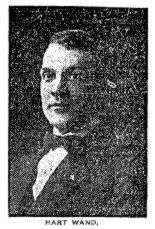Hart Wand
| Hart A. Wand | |
|---|---|
 | |
| Background information | |
| Birth name | Hart Ancker Wand |
| Also known as | Hart A. Wand. |
| Born |
March 3, 1887 Topeka, Kansas, U.S. |
| Died |
August 9, 1960 (aged 73) New Orleans, Louisiana, U.S. |
| Genres | Fiddle band |
| Occupation(s) | Musician, Bandleader |
| Instruments | Fiddle |
| Years active | 1900s-1910s |
Hart A. Wand (March 3, 1887 – August 9, 1960), was an American early fiddler and bandleader from Oklahoma City, Oklahoma, he was of German extraction .In the musical world he is chiefly noted for publishing the "Dallas Blues" in March 1912 (copyrighted in September). "Dallas Blues" was an early example of published twelve-bar blues song.[1][2][3]
Little is known about Wand. He was named for his maternal grandfather, Hart P. Ancker. Wand was an 89er, coming with his parents, a brother, and two sisters from Kansas at age two. His father John, an immigrant from Frankfurt, Germany, and successful druggist in Topeka, immediately after the run set up a tent drugstore in what would become Oklahoma City. After his father's death in 1909, Hart Wand took control of the Wand & Son manufacturing plant in Oklahoma City, and kept up his musical interests. Wand moved his business to Chicago sometime before 1920, and by 1920 had settled in New Orleans. He traveled through Europe, Latin America, and Asia for his business. Samuel Charters, who interviewed Wand for his book The Country Blues (1959), stated that Wand was respected and well liked in New Orleans.[4] Wand's wife, Alberta, died in 1982.
References
- ↑ Duncan, Blues Fiddling Classics, page 30: "This tune was the first 12-bar blues to be published (March 1912). It was written by violinist/band leader Hart Wand from Oklahoma."
- ↑ Davis, The History of the Blues, page 59: "The composer of the very first copyrighted "blues" was Hart Wand, a white Oklahoma violinist and bandleader whose "Dallas Blues" was so named because its melody gave a black porter who worked for Wand's family "the blues to go back to Dallas." This was followed a few months later by "Bably Seal Blues", a negligible item by the black vaudeville performer Arthur"Baby" Seals and ragtime pianist Arthur Matthews."
- ↑ Davis, The History of the Blues, page 59: "But in a sense, the very first blues was the twelve-bar opening verse to the pop song "Oh, You Beautiful Doll," which was published in 1911."
- ↑ Charters, The Country Blues, page 42.
Bibliography
- Charters, Samuel B. The Country Blues. Da Capo Press, 1975. ISBN 0-306-80014-4
- Davis, Francis. The History Of The Blues: The Roots, The Music, The People. Da Capo Press, 2003. ISBN 0-306-81296-7
- Duncan, Craig. Blues Fiddling Classics. Mel Bay Publications, 1994. ISBN 0-7866-1855-8